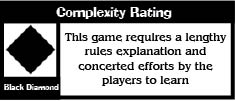I tried to learn Puerto Rico two years ago, and had a second "go" in the past week, "cramming" the rules and strategy recommendations over several nights, and I think I'm still confused. Perhaps it's because the game concepts are different from what I am used to in other games.
The mechanics are simple enough. Each player picks one of several roles (builder, settler, mayor, etc.) and then the players take turns playing that role, with the original picker getting some extra benefits over the other players of the respective roles. Which brings me to the first point:
Puerto Rico is what I call a "curved" game, insofar as what matters is not how much benefit you get in the absolute sense from a role, but how much more you benefit compared to other players. In this regard, its shared roles makes it most like hold 'em (poker) with its "shared" board. If you're a poker player and you understand how hold 'em differs from other forms of poker, you'll get my point about Puerto Rico versus other games. (And if you don't understand this, maybe it's not the game for you.)
The goal in the game is end up with the most victory points, but aiming directly for them might not be the best way to get there. Early in the game, it makes better sense to go for cash, to acquire buildings and other elements of a victory point "machine," and then switch to playing for victory points about mid-game. This back-and-forth is not to everyone's taste.
And then the matter of the victory condition itself. I'm used to games where someone wins if they are the first to reach a specified number of victory points, say 15, or if they have the most victory points at the end of a specified number of rounds, say 15. But that's not how Puerto Rico works.
Basically, you win if the game ends (in one of three different ways) when you have the most victory points. So the goal of the game is not just to get the most victory points, but to end the game when you have the most. If you have the most victory points and can't end the game, and someone overtakes you while ending the game, the other person wins. On the other hand, you shouldn't end the game at a time when you don't have the most victory points, because someone else will win.
Puerto Rico could be a fascinating game for hard core gamers who are willing to take the time to learn its nuances because they plan to play it many times. But as a game to learn once and forget about, I would not recommend it.
